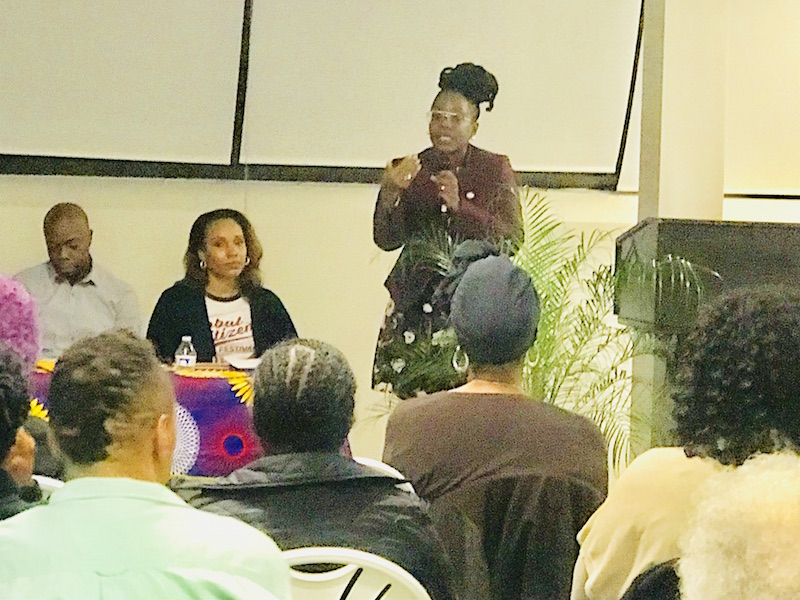Ever walked into a meeting and instantly thought, “ Wow, does this thing come with theme music?”
That was the vibe when walking into the Sustaining Our Ground Community Empowerment Forum last night at the Bedford-Stuyvesant Restoration Plaza.
Although what brought the people in the room together was pure outrage. Influence was still evident. You couldn’t tell who was who, the age differences ranged from child to elder, signifying a generational wave of information and reform. Natural hair styles, burning incense and the kente cloth that adorned the table behind the podium where each speaker stood, told a tale of a fighting culture.

A quiet storm began to brew as City Council Member Alicka Amprey-Samuel (D-Brownsville, Bedford-Stuyvesant, Crown Heights, East Flatbush) led the discussion of ‘Sustaining Our Ground.’ With ongoing battles between African American homeowners and government agencies who are eradicating them from their properties, Brooklyn leaders were compelled to inform the people of their options.
Ampry-Samuel shared a story of the New York City Housing Authority’s (NYCHA) disconnect with long time tenants, recounting a time housing employees changed locks on a tenants’ door while the tenant lie dead in her bedroom, just feet away from the front entrance.
Ampry-Samuel explained her fight for the rights of tenants kept her huddled in a five-hour 40-minute meeting earlier this week. The results of the conference detailed the conversion of Section 8, which is a housing subsidy granted to low-income renters, into a Section 9 agreement, which ultimately cuts the monetary funds that are currently being received by lower-income persons.

Under section 9, funding would be allocated to properties that are steadily popping up around the county. While hopes for a better apartment is centered around a city-wide lottery, many of the apartments being auctioned off represents roughly 30% of the building while the other 70% are being sold or rented at market value, Ampry-Samuel said.
Furthermore, NYCHA is increasingly becoming a privatized entity in itself. Ampry-Samuel pointed out that those currently receiving government subsidies may face hardship once contracts between private owners and NYCHA dissolve. Posing the question, what happens next?
Housing advocate Michael Bailey shared his experience in working closely with those facing displacement due to evictions or the rise in rent. Bailey says countless women of ethnic descent are being affected in staggering numbers on the daily, by a systematic disparity.
While minority neighborhoods are being evidently gentrified, Omowale Clay, a social justice advocate chose to focus his attention on community sustainability versus diversity concerns. Going back to what Amprey-Samuel touched on while she initially spoke in identifying the need for minorities to establish a community land trust, which ultimately grants the community stewardship over the land and its development.
Bedford Stuyvesant’s Community Board 3 District Manager Henry Butler shared his knowledge of property development. As council members dictate what to do with city owned land, Butlers advice for residents was to attend board meetings and get familiar with contractors set to develop in the community. He also reminded attendees that no town hall meeting or community forum is private and “we the people have a right to know, to contest and to rectify as we see fit. Every voice counts.”
In addition to speaking up on behalf of our communities, attorney Esmeralda Simmons addressed the 2020 census and its viability. While African Americans and other minority groups tend to shy away from this nationwide assessment, Simmons vehemently expressed just how important it is to the culture’s sustainability. Not only does the census count the people currently living in each state nationwide, but it also helps to distribute the much-needed funds into economically failing localities, she said.
Sustaining Our Ground Community Empowerment Forum was met with whooping, hollering and exaggerated ‘yes,’ with powerful voices, such as small black business owner Tiecha Merrit, who left the crowd of engaged listeners with a token of excellence evoked on Bedford Stuyvesant’s Tompkins Avenue. “Tompkins Avenue is black girl magic.. more than 15 businesses are owned by women of color,” she said.
Community advocate and CB3 member Santina Payton concluded the meeting with words of dark inspiration; “If you are afraid to die, you’re already dead.”
May the residents of Kings County exercise their rights to sustenance.











